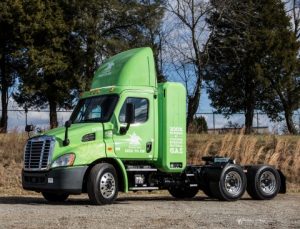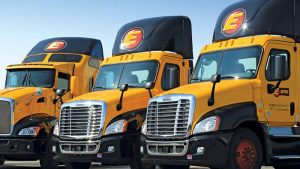Fleets Embracing CNG and RNG: The Future of Sustainable Transportation

The unpredictable cost of diesel and the movement towards reducing emissions in the transportation sector has motivated fleets to search for dependable alternatives, with many looking to natural gas as a cost-effective, cleaner, and stable option.
The unpredictable cost of diesel and the movement towards reducing emissions in the transportation sector has motivated fleets to search for dependable alternatives, with many looking to natural gas as a cost-effective, cleaner, and stable option. There are several factors that go into calculating a fleet’s total cost of ownership, with fuel usually topping the list.
CNG’s Long-Standing Presence in Heavy Duty Sector

While there is more than one option to reduce emissions for fleets, compressed natural gas (CNG) has a long-standing presence in the heavy-duty sector.
While there is more than one option to reduce emissions for fleets, compressed natural gas (CNG) has a long-standing presence in the heavy-duty sector. The demands related to cost, range, and performance have long been met by this clean-burning fuel, and the emission reductions are furthered by the addition of renewable natural gas (RNG), which has been deemed the only carbon-negative fuel currently available, meaning that it actually slows down climate change. It is no wonder some of the nation’s leading fleets are achieving and often exceeding their stated emission-reduction goals with non-fossil RNG and CNG.
RNG: Taking the National Stage
Recognized nationally as a leader in fleet sustainability, Estes Express Lines has made it more than a mission to reduce emissions — it’s a culture. Aside from being one of the first freight carriers to join the EPA’s SmartWay Transport Partnership, Estes’ leadership group has worked tirelessly to cut emissions through the use of the most efficient trucks available, and leveraging the double-green benefits of RNG.
Enjoying our insights?
Subscribe to our newsletter to keep up with the latest industry trends and developments.
Stay InformedEstes’ RNG-Powered Tractors
Currently, Estes is running more than 190 RNG-powered tractors within its fleet, with many of these trucks fueled by Hexagon Agility’s 175 diesel gallon equivalent ProCab RNG fuel systems, enabling an up to 800-mile range per fill up. The carrier also signed a fuel supply agreement to use RNG made from organic waste.
“RNG is enabling us to drive towards carbon-negative performance while reducing costs in our less-than-truckload (LTL) operations,’’ said Michael Palmer, vice president of fleet services at Estes.
All-in on Natural Gas: The CTS Story

Currently, Estes is running more than 190 RNG-powered tractors within its fleet, with many of these trucks fueled by Hexagon Agility’s 175 diesel gallon equivalent ProCab RNG fuel systems, enabling an up to 800-mile range per fill up.
Starting in 1985 with a single truck, Contract Transport Services (CTS) has grown to a fleet of more than 150 trucks, all of which run on natural gas. The company began using CNG in 2012 as a requirement of a contract that was up for bid. While the team first estimated that the change would add three cents more per mile in terms of maintenance costs and offer a more limited range, CTS decided to move forward and bid on the CNG contract lane.
CTS Embraces RNG for Lower Emissions
Fast forward a decade, and the carrier now runs 100 percent on natural gas, recently shifting to RNG to lower their emissions even further. Although the cost of natural gas trucks is higher than their diesel counterparts, CTS has seen its total cost of ownership drop because of the lower fuel spend. And by working closely with Hexagon Agility, the CTS team has seen even higher savings with the implementation of a solid maintenance program, company officials said.
“The difference in cost between a diesel day-cab truck and a CNG of comparable specs and range is roughly $50,000 to $55,000,’’ said Curt Reitz, president of CTS. “At today’s fuel prices, you can expect to save roughly $20,000 annually versus diesel, so the basic economics really make sense. Additionally, we are finding we can refurbish and reuse the fuel system on a second truck. With the fuel system being a significant portion of the cost difference, the economics are even more compelling. Add on the use of RNG, which is either carbon neutral or even carbon negative and we are doing something great for our fleet and our customers in terms of carbon reductions, too.”
The Growing Trend of Fleets Embracing CNG and RNG

Although the cost of natural gas trucks is higher than their diesel counterparts, CTS has seen its total cost of ownership drop because of the lower fuel spend.
As more companies recognize the environmental and financial benefits of using CNG and RNG, the trend of fleets adopting these fuels is rapidly growing. The potential for significant emission reduction and cost savings make CNG and RNG attractive options for companies looking to improve their sustainability efforts and overall fleet performance.
Government Initiatives Supporting Natural Gas Adoption
Government initiatives and incentives are also playing a crucial role in promoting the adoption of CNG and RNG for fleet use. These programs aim to encourage companies to make the switch to cleaner fuels by offering financial support and reducing regulatory barriers.
Infrastructure Development for CNG and RNG
One of the key factors in the widespread adoption of CNG and RNG as alternative fuels is the development of refueling infrastructure. As more fueling stations are built across the nation, accessibility and convenience will improve, making it even easier for fleets to make the switch to natural gas.
Collaboration with Industry Partners
Collaboration between fleet operators, fuel providers, and equipment manufacturers is essential for the successful implementation of CNG and RNG in the transportation sector. By working together, these stakeholders can develop innovative solutions that help companies achieve their emission-reduction goals and improve overall fleet efficiency.
The Future of Sustainable Fleet Management
As the trend of fleets embracing CNG and RNG continues to gain momentum, it is clear that these alternative fuels are playing a significant role in the future of sustainable transportation. Companies that make the switch to CNG and RNG can expect to see not only impressive environmental benefits but also substantial cost savings over time. With the support of government initiatives, infrastructure development, and industry collaboration, natural gas adoption in the transportation sector is set to continue its rapid growth, paving the way for a cleaner, more efficient future.
More news on Alternative Fuels in the trucking industry, click here
External Resources
- U.S. Department of Energy – Alternative Fuels Data Center: Compressed Natural Gas (CNG)
- U.S. Environmental Protection Agency (EPA) – Renewable Natural Gas (RNG)
- Natural Gas Vehicles for America (NGVAmerica)
- Clean Cities Coalition Network
- American Gas Association – Natural Gas Vehicles
- RNG Coalition
- U.S. Department of Energy – Alternative Fuels Data Center: Incentives and Laws





















